
Mechanism of action of tricarbonyl rhenium complexes.a Summary of SelectScreen Kinase Profiling showing the % inhibition of JVG045 and ps27 on the kinases FGFR1 and Src. b Western blots in pancreatic cancer cell lines AsPC-1 and HPAF-II showing that JVG045 (10 μM) indeed inhibits the phosphorylation of FGFR1 with an effect comparable to the selective FGFR inhibitor BGJ398 (5 μM); ReCl was used as negative control. c Autophosphorylation activity of FGFR1, no difference in kinase activity is detected in the presence of JVG045, indicating that there is no direct inhibition. d Src kinase assay shows that, when used on the purified kinase, JVG045 does not have a direct action compared to the selective Src inhibitor AZD0530. e, f JVG045 (10 μM) increases the production of reactive oxygen species (ROS) in pancreatic cancer cell lines AsPC-1 (e) and HPAF-II (f) measured using the H2DCF-DA probe. Results are expressed as Mean ± SEM and are representative of at least three independent experiments. Mean fluorescence intensity DMSO: AsPC1 = 5368 + 1517 (n = 4); HPAF-II =4094 + 1454 (n = 3)
|